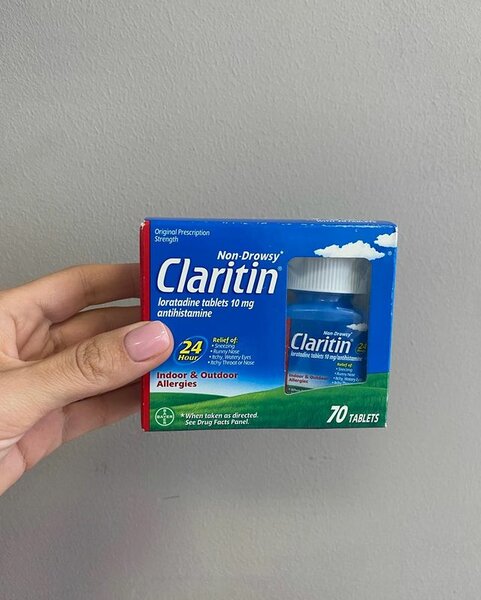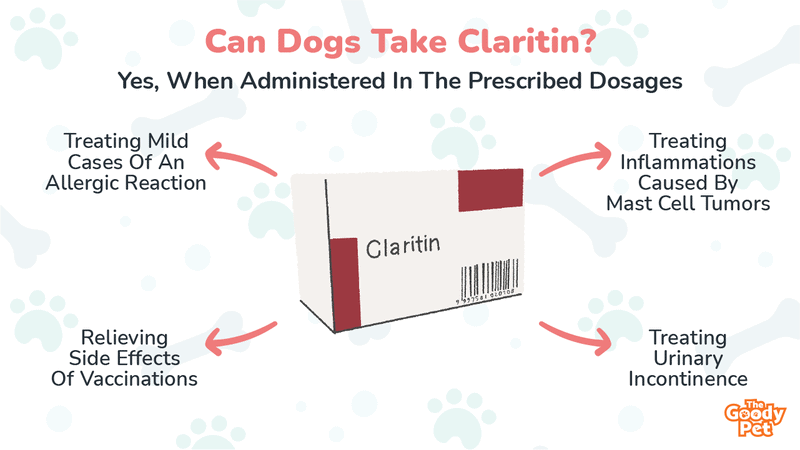There is no worse feeling than seeing your canine buddy sneezing and suffering from other symptoms typical of an allergic reaction. And if you have some Claritin lying around, it is only normal to ask if this medication will be effective for your canine buddy.
So, can dogs take Claritin? Yes, dogs can safely use Claritin. But before this antihistamine is administered to your dog, you should consult with a vet to ensure that Fido’s symptoms are due to an allergic reaction and to get the appropriate dosage.
There you have it! Claritin is effective in stopping dog allergies, and even better, this drug is known to induce little to no side effects in pooches when administered properly. However, regardless of how effective Claritin can be for dogs suffering from an allergic reaction, there are some dangers associated with the use of this drug in pooches, and these risks will be properly explained in this article.
But before we go into that, let’s see why dogs can safely use Claritin, as well as the recommended dosage for this drug.
Can Dogs Take Claritin?

Yes, Claritin is safe for dogs to use when administered in the prescribed dosages.
Allergic reactions in dogs are common, and they typically occur when a pooch’s immune system releases histamines to fight off otherwise harmless allergens that the dog may have come in contact with.
And it is this release of histamines by the pooch’s immune system that typically triggers the manifestation of symptoms such as swelling and itchiness.
Claritin, known generically as loratadine, is an over-the-counter antihistamine that is typically used to counter symptoms caused by the release of histamines in a pooch’s body. And it has to be said that this drug is quite effective at treating mild cases of these allergic reactions.
Loratadine contained in Claritin was initially formulated to treat runny noses and hives in humans. But as time passed, scientists began using this drug to treat itchy skins, and by extension, other symptoms of allergic reactions in dogs.
That said, regardless of its effectiveness at treating mild symptoms of allergic reactions in dogs, Claritin isn’t suitable for severe allergic reactions in pooches, with this condition requiring emergency medical care.
How Much Claritin Can I Give My Dog?
The safe dosage for Claritin usage in dogs typically varies according to breed and size, but this drug is generally prescribed to be used either once or twice a day.
That said, Claritin is usually available as either a 5 mg or 10 mg rapidly disintegrating tablet, a 10 mg chewable tablet, or a 5 mg per 5 ml syrup.
Vets will generally prescribe that dogs use 0.2 mg of Claritin per pound of the dog’s body weight. And what this means is that if you have a small pooch that weighs just 25 lbs, such a dog should use 5 mg of Claritin per day.
Also, with Claritin, the duration of administration depends on the type of illness being treated, the pooch’s response to the drug, and the development or not of side effects. And to avoid a relapse, it is advisable that you complete the prescribed Claritin dosage for your canine buddy.
What Is Claritin Used For?

Claritin is a second-generation antihistamine that is commonly used to treat the various types of allergic reactions in dogs, as well.
Effective At Stopping Allergies
The major use of Claritin in canine treatment is for relieving dog allergy symptoms that may develop in the pooch either due to certain food or environmental triggers.
That said, Claritin is effective at treating dog allergies because it works by inhibiting the actions of histamine, which is responsible for inducing allergy symptoms such as itching, sneezing, skin rashes and itching, within a pooch’s body.
As mentioned in the opening paragraph, Claritin is also a second-generation antihistamine, and what this means is that this drug doesn’t induce drowsiness that is typical with the first set of antihistamines that were produced for dogs.
What Else Can Claritin Be Used For?
Apart from being effective at alleviating allergy symptoms in dogs, Claritin can also be used in various other ways such as:
- Treating inflammations caused by mast cell tumors in dogs.
- Treating symptoms of snake and insect bites on dogs.
- Relieving side effects of vaccinations in dogs.
- Treating urinary incontinence in dogs.
Can Claritin Be Bad For Dogs?
There are several side effects associated with the use of Claritin in dogs, and this antihistamine can also have toxic effects on pooches when it is used in collaboration with certain antibiotics.
Several Side Effects
As typical with antihistamines, Claritin usage induces certain side effects in dogs. However, on a positive note, these side effects are usually not serious, and they tend to wear out after a short period.
That said, some side effects that are commonly observed with Claritin usage in dogs include:
Symptoms such as an increased heart rate, hyperactivity, depression, and dry eyes are typically associated with Claritin usage in humans; Hence, you should contact your vet as soon as possible if you notice any of these signs in your Fido.

Interaction With Other Medications
Apart from inducing several side effects, Claritin also interacts with certain antibiotics and antifungal medications, and these combinations can be quite dangerous for dogs.
One of such combinations toxic to dogs is the application of the decongestant, pseudoephedrine, in formulating Claritin products.
Pseudoephedrine is known for inducing clinical signs such as nervousness, fast heart rate, and high blood pressure in dogs; Hence, Claritin products containing this substance should be avoided at all costs when treating your pooch.
Additionally, some ‘quick-dissolve’ forms of Claritin may contain the artificial sweetener, namely xylitol, which is found to be extremely toxic and sometimes fatal to dogs when ingested.
Suppose you have to treat your canine buddy with Claritin. In that case, it is recommended that you stick to antihistamines containing just loratadine to avoid poisoning your pooch from ingesting these products.





